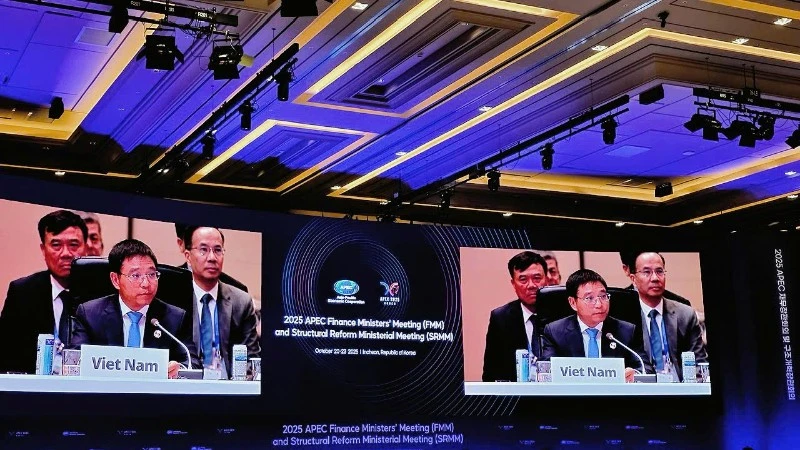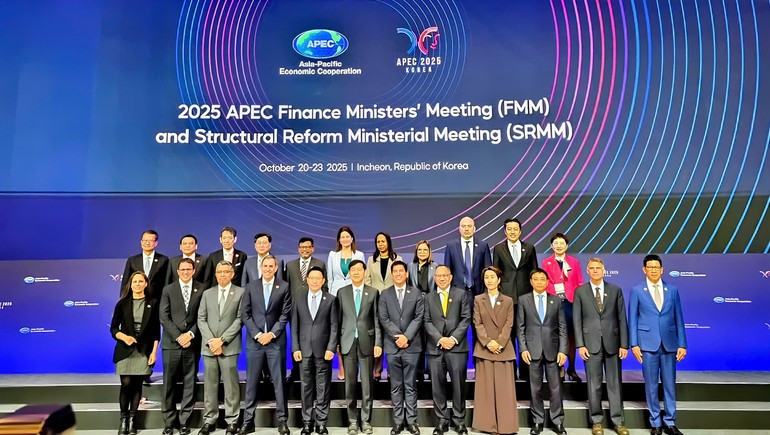APEC 2025: Viet Nam actively promotes cooperation in innovation, digital finance and fiscal policy
At the 32nd APEC Finance Ministers’ Meeting (FMM 2025) in the Republic of Korea (RoK), Viet Nam reaffirmed its commitment to making effective contributions as an active member working towards the stability and shared prosperity of the APEC region.

The 32nd APEC Finance Ministers’ Meeting (FMM 2025) took place in Incheon in the RoK on October 21, as part of the APEC 2025 Leaders’ Week. The event was chaired by the RoK Deputy Prime Minister and Minister of Economy and Finance, Yun Cheol Koo. Viet Nam’s delegation, led by Minister of Finance Nguyen Van Thang, joined finance ministers and senior representatives from APEC member economies, along with international financial institutions.
Under the theme “Sustainable Growth and Shared Prosperity in the Region,” the meeting focused on three priority areas for APEC 2025: innovation, digital finance, and fiscal policy.
Speaking at the meeting, Minister Nguyen Van Thang shared updates on Viet Nam’s macroeconomic situation and outlook. Viet Nam’s economy expanded by 7.84% in the first nine months of 2025 and is on track to achieve annual growth of between 8.1% and 8.5%. Inflation remains under control, with the average Consumer Price Index (CPI) rising by 3.27% over the same period.
Looking ahead, Viet Nam aims to achieve double-digit economic growth at 10% or higher during the 2026–2030 period. The country will continue to advance key strategic directions in science, technology, innovation, and national digital transformation; strengthen international integration; and improve institutions and legal frameworks. Efforts will also focus on minimising administrative procedures, addressing institutional bottlenecks, and turning institutional reform into a competitive advantage to unlock social resources. Viet Nam is determined to further develop its private sector, providing strong momentum for rapid and sustainable national growth.

Discussing APEC 2025’s core agenda, which centres on innovation, digital finance, and fiscal policy, Minister Nguyen Van Thang emphasised that in Viet Nam, science and technology, innovation, and digital transformation are key drivers of economic growth.
The Ministry of Finance of Viet Nam is implementing several major initiatives, including accelerating digital transformation in public finance and financial markets, developing international financial centres in Ho Chi Minh City and Da Nang, and piloting a domestic digital asset market.
While artificial intelligence (AI) offers many positive contributions to the transformation of the financial sector, it is important to recognise the potential risks it may pose. Accordingly, Viet Nam shared its views and experiences on implementing measures and policy orientations to ensure the safe, transparent, and sustainable application of AI.
From the perspective of fiscal policy management, particularly as pressures on public finance continue to rise, Viet Nam emphasised the need to shift the focus of fiscal policy from short-term stabilisation to structural investment and long-term risk management. Key priorities include reforming the social spending system towards sustainability; making strategic investments in human capital and technology; adopting flexible fiscal governance; optimising revenue sources; and enhancing the efficiency of public expenditure through performance-based budgeting.
At the meeting, finance ministers shared their assessments of the global economic landscape. Although the world economy has shown signs of recovery after the pandemic, it still faces numerous challenges such as geopolitical tensions, sovereign debt risks, and climate change. Against this backdrop, APEC members agreed on the importance of maintaining flexible macroeconomic policies and strengthening multilateral cooperation as key drivers of regional resilience and growth.
The ministers reaffirmed that innovation is the main driver of productivity growth and highlighted the importance of public–private cooperation in developing technology and digital finance. The meeting also underscored the potential of AI applications in finance — particularly in expanding access to capital for micro, small, and medium-sized enterprises (MSMEs). APEC members called for coordinated efforts to establish safe and transparent policy frameworks to promote AI ecosystem development, protect consumers, and ensure financial stability.

Regarding fiscal policy, the ministers reaffirmed the crucial role of sustainable fiscal management in maintaining macroeconomic stability. They agreed to strengthen fiscal discipline and prudent debt management; enhance the efficiency of public spending with a focus on infrastructure and high-quality human capital investment; and promote public–private partnerships (PPP) as an effective tool to mobilise social resources and improve public services.
At the conclusion of the meeting, the ministers adopted the “Incheon Plan 2026–2030,” which sets the strategic direction for the APEC Finance Ministers’ Process (FMP) over the next five years.
Accordingly, the roadmap is built on four key pillars: Innovation; Finance; Fiscal Policy; and Access and Opportunity.
The meeting also approved the Joint Ministerial Statement of APEC Finance Ministers 2025.
Under the agreed roadmap, China will chair the 33rd APEC Finance Ministers’ Meeting (FMM 2026), continuing the spirit of cooperation and shared prosperity across the APEC region.








